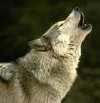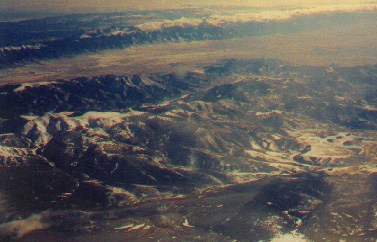


Joseph Vincent Siry, Ph.D.,
U.C. Santa Barbara, Emory University, &
Washington and Lee University.
Office: Beale Bldg. –Park Ave. side– room 105.
Phone:
407.646.2648
Office Hours: T–1:30-2:30,
W–1:00-3:00, Th–2:30-5:00.
Web site URL: http://myweb.rollins.edu/jsiry
Goals of the Course
Wilderness is among the most definitive, contested, and compelling concepts shaping our
nation’s history. For those of you seeking a challenge this may be a most
rewarding inquiry into the origins of our wildlife heritage and the future legacy
of nature protection. Working reciprocally in this course we will explore
several tiers of this subject, focusing specifically on how questions about American
geography, biodiversity, and an urgent need for conservation raise concerns
over the character of our people, the tensions among facts, opinions, and
illusions, the moral cognizance required to act with some urgency to preserve
wild places, and the bequest we ought to leave to subsequent generations.
We will also analyze verbally and in writing a sample
of the arguments presented by some of the country’s most stimulating authors,
including Roderick Nash, Wallace Stegner,
Rachel Carson, Terry Tempest Williams, Aldo Leopold, William Faulkner, Garrett Hardin, Annie Dillard, Michael Pollan,
and Bill McKibben.
Students should arrive alert in class with three to
five questions having read the assignments before that meeting and ready to
discuss our texts and pose arguments the assigned readings raise for you.
More practically, participants will have opportunities
to hone their skills in reading analytically, in verbally conveying their views
about ecological restoration in a supportive setting, and in expressing your
ideas in writing as you learn throughout the term. Especially in our class, I
would hope, now and again, you will experience the delight and enjoyments of
being moved by the profound power of ideas and articulate prose to lift your
spirits, amend your behavior, nourish your more curious sensibilities, and even
move you to sensibly act as a means to improve both yourself and our world.
What to do? | Policies | Assignments | How I judge | Calendar
Texts, other
authors (Stegner, Hardin, Dillard, Leopold,) e-mail I send, & class web site as
assigned:
Terry
Tempest Williams, An Unspoken Hunger
Bill
McKibben, The End of Nature
Roderick
F. Nash, Wilderness and the American Mind
Lynn
Margulis, Symbiotic Planet
William
Faulkner The
Bear [on-line version]
Course Requirements [see page four about what you must
complete]:
- Regular, punctual attendance with alert, vocal,
& active participation in class work.
B.
Preparation
for and improvement in participation by bringing the texts & /or assigned questions answered to class and
working groups for analysis on meeting days; by verbally sharing the
free-writing we do in classes. Meeting with me for a conference about your work.
- Two, –thee to four page– exploratory
narrative essays – on an assigned topic a week before the discussion
of the assigned readings is scheduled on which the essay is based.
- One,
–six to eight pages– Final paper with footnotes, bibliography,
tables and pertinent photographical or artistic representations with the
appropriate citation of its source and a phrase explaining their purpose concerning the protection of wildlife
and fisheries.
Grades: all assignments are graded with careful attention to each of these criteria: {CLIFS}
1. C clarity,
coherent concepts, spelling, grammar, & logical consistency.
2. L length
& development of your examples, key ideas, arguments, or presentations.
3. I informative
value of your evidence from the class texts, library research, or interviews.
4. F frequency
of details, or stories from the lectures, journals, notes, & readings.
5. S sufficient
elaboration examined in a thesis; introduction, summary, & conclusion.
The
names and phone numbers of two other students in the class:
1. _____________________________ 2. ___________________________
What to do? | Policies | Assignments | How I judge | Calendar | Texts
My policies:
I am here to encourage you to excel in learning new
concepts and practicing your writing and speaking abilities in an effort to
create meaningful discourse. My purpose is to feed your inquiring intellect
with significant ideas in a consistently coherent and challenging manner. I
anticipate you will raise questions and actively work together to overcome any
challenges the course material may pose for you in achieving an excellent level
of expression and performance based on an improved understanding of the readings.
I encourage you to discuss ideas, passages, and assignments with me in a scheduled
conference and visit during my office hours.
Active
learning
Keep in mind that participation in this course
involves not only alertness but also listening respectfully without
interrupting other speakers who are presenting their views on the assigned
readings. I do ask you what other's say, so paying attention to classmates and
me is a sign of respect that I do reward in all my classes. Only one person can
speak at a time, so be alert. The use of electronic media for other than class
purposes is so rude that it is treated as an absence if you are texting,
surfing, e-mailing, or digitally inattentive to our class discussion. My
outcome: you consistently
contribute your analyses verbally in class to enrich our discussion.
Late papers
One reason for writing is so that you can rewrite to
correct your errors. Submit all assigned work during the class on the day any
assigned work is due. Late papers cannot earn equal credit as those received on
time in fairness to those punctual students. This is also because we discuss
the importance of what you have discovered and expressed in class that very day
the essay is due. Always back-up your work as you write, start at least a week
before, and always keep a printed copy of your notes on the material you turn
into me.
Paper format
The look of a college paper is always a professional
document with an accurate date and page numbers indicating when the work was completed. I ask you to place a cover page with
your name, phone number, essay title and an abstract of two to three sentences
covering the substance of your essay for purposes of privacy because I make
extensive comments on your work. Spelling and grammar errors are unacceptable.
All papers are to be typed double spaced in either Arial or times new roman font and should have one inch margins and
22-23 lines to the page as a minimum.
Academic honesty and plagiarism
Cheating or copying without proper citation is called plagiarism and is the most serious academic offense of novices
and professionals alike. By the use of words or ideas that are not your own and
are either: 1) insufficiently acknowledged, or 2) not acknowledged at all you
commit the offense. The consequences are that you can fail the assignment, or
even the class, since every offense is a violation of the College’s honor code.
As such, I am obligated to report such violations to the Deans office.
Formal
papers.
The class is focused on your writings. Essays should be have a title based on your contents, with its principle author’s full name and phone number, date completed, and with page numbers on the upper right hand corner. The essay should follow the style and content of papers in the Rollins Undergraduate Research Journal and it should be double spaced, 12pt font (either Times/Times Roman or Arial) and at least 5 pages long, excluding the Literature Cited page and any notes, figures, photos, or graphs you may use–Do ask Suzanne Robertshaw, in TJs, for Instructions to Authors).
Endnotes
or footnotes are preferred rather than parenthesis with author,
date, and pages. The final review
paper for the term must be handed in no
later than 17 April 2012 .
Of course you are very welcome to hand it in earlier, on April 10, and
you are also encouraged to discuss ideas with me and
submit a draft for my review & comments before final submission on the due
date. I anticipate that the best parts of
your papers will be presented in class. I make comments on the final stage
draft and return the paper to you for revisions that are due May 1, 2012 or
earlier for a grade.
What to do? | Policies | Assignments | How I judge | Calendar
Month and days
January
17 What is your favorite wild area or creature? Verbal presentation prep
for 26-31.
19 Introduction:
“The habitat
Problem: What is “waldsturben?”
24 Nash and Williams -- What is wilderness; strictly speaking? Nash, pp. vii-43.
26 Eroticism,
Boundaries & “Appetites” Williams, pp. 79-96.
31 Mapping your wild places draw & verbally compare Williams to Nash on places.
February
2 Romanticism and Transcendentalism Nash,
pp. 44-107.
7 Making Sense of preserving wild areas How
wild are you?–Essay draft due.
9 Muir and the battle to save the wild canyon Nash, pp. 108-181. Field trip option
14 Nash & Stegner compared and contrasted Nash, pp. 182-199.
16 Biological
realities as a limitation–species Nash,
pp. 200-237.
21 Essay due –How wild are you? oral presentation of the readings used in your essay. √
23 A philosophy of protection--oral presentation. Nash, pp. 238-271.
28 2
views Nash Alaska &
Pollan: a dialectic Nash. pp. 272-315, Pollan, pp. 104-127.
March
1 Mid-term --compare Nash & Pollan w/ Stegner & Leopold’s views—short essay drafts due √
Field Trip to Chelonian Institute, Oviedo, or Environmental
Ed. Center, Seminole, Fla.
3-11 Spring Break No class
meetings
13 The
End of Nature? Mckibben & Nash – Nash article on the future of wilderness
15 Challenges of economics & technology, McKibben.
pp. 3-46, Williams, pp. 132-140.
20 Fern Creek kids & us–"Where in the World are all the Animals." Game play
22 Adaptability & Myths Nash
342-378. – McKibben.
pp. 47-91, Dillard
27 Envisioning an Ecological Community Contrast Essay draft
paper due √
29 Photographing ecological costs of enterprise McKibben, pp.95-138, Williams, pp. 97-131.
April
3 Criticisms of Bureaucratic views of wilderness Williams, pp. 133-145.
5 Climate change (contrasting views) McKibben,
pp. 63. Margulis
8 Field Trip to Chelonian Inst, Basic Factors: Nash, Williams, Margulis & McKibben
10 Essay due: Values
of wildlife protection due to climate change from all the readings. √
12 Day off in lieu of fieldwork
day start the reading of Faulkner's The
Bear.
17 The wild frontier verbal
presentations for discussing: Faulkner's The
Bear.
19 Symposium on how air
pollution is redefining wilderness–threatening to preserve wildlife areas.
24 Class Workshop: Environmental Ed. Center,
Seminole, Fla. Observing loss of wildlife ranges.
26 Verbally summarize a value of the wild legacy about some place we
all share.
May 1 End of term for T-Th classes: Revised essay, map, geology & values analysis due. √
May 7th,
8:00 AM to 10:00 AM, Oral presentation of the thesis, arguments &
evidence from the above essay on: "What sorts of
actions are needed to protect our remaining natural areas so as to avert
further loss of biological diversity and wildlife ranges?" Final exams are comprehensive based on all
of the assigned readings you must use from the course.
Outcomes: You, with practice, are able to articulate seven to
ten reasons how a specific place is of significance to protect for wildlife
preservation, water conservation, and restoring ecological health.
What to do? | Policies | Assignments | How I judge | Calendar
Assignments:
Each
of these means of evaluating your achieving the outcomes of the class is worth
20 percent of your grade.
Assignment details:
- Growth in your preparation for and participation
in the class by using the web site,
bringing the texts, and /or assigned writings to class for analysis on our
meeting days, by holding a conference with me before mid-term, or by
verbally sharing the free-writing we do in classes with other participants,
during class time.
Many days we do free-writing based on what
you were assigned to read for class, be prepared to read
passages for credit in class that day and then incorporate your ideas into
essays.
All essays are
rewritten after they are initially due. I keep track of everything you write and the frequency of references
to the assigned readings and outside sources. 20%.
- Two, – two to four page long, –
exploratory narrative essays – on an assigned topic based on the
assigned readings, a week before the concepts from the texts are discussed
in class. 40%.
b1- So what is
wild in you and us all? Draft 2/7 final Due
February 21
b2- How do Nash, Stegner, Pollan and Leopold differ and how do they diverge?
Is there a matrix of how necessary wild areas are even for opposing reasons?
Draft 3/1 Due March 29.
- One, – seven to nine pages. – Final
paper with footnotes, bibliography, tables and pertinent photographical or
artistic representations with the appropriate citation of its source and a
phrase explaining their purpose. Due
April 17 (in draft)–revised and due for grade May 1.
- photographical stage: ideal versus reality–should
be done by 3/29
- map stage:
i.
Where is this place's physiographical region and
watershed? done by 4/5
ii.
Geologically, in time (How and where did it
originate)? done by 4/10
- Thesis stage: of what significance in terms of heritage & values now? 20%.
- May 7th, 8 to 10:00 AM, Oral
presentation of essay on: What sorts of actions
are needed to protect what is left of our natural areas so as to avert
further loss of biological diversity and wildlife ranges?
- Based on your final essay–photo, map &
work project describing a place's ecological integrity that should be
"forever wild."
- The corrected essay (C.3 above) is resubmitted on May 1, and a seven-minute verbal presentation is expected from you to
cover what you learned.
Final exams are comprehensive:
you must attend or risk failing the course- 20%.
Because
this is comprehensive you should reveal an understanding of all the assigned
readings.
What to do? | Policies | Assignments | How I judge | Calendar
Outcomes for this course on wilderness principles:
A.
You can verbally interpret written expression with both supporting and
contradicting evidence.
B.
Participants will examine and explain in writing and orally the meaning of
graphical, maps, photographical, and artistic expressions of natural values as
externalities.
C.
Having read the material assigned, you can describe the competing values of
heritage, economy, and science for reserving land from settlement, grazing,
intensive agriculture, or industrial uses.
D.
Having used pertinent web site material from myweb.rollins.edu & mediasite, you will verbally and in writing accurately
portray the roles of water, watersheds, energy, atmosphere, and landscape in
the protection of wildlife, fisheries, or agricultural (natural assets) sources
of biological wealth.
Changes in the Schedule
If alterations of this
published schedule must occur I will announce them in class; a revised syllabus
will be explain extensive changes should that become necessary. If you are
absent, telephone one of your classmates to ascertain that day’s announced
changes, if any.
What to do? | Policies | Assignments | How I judge | Calendar
